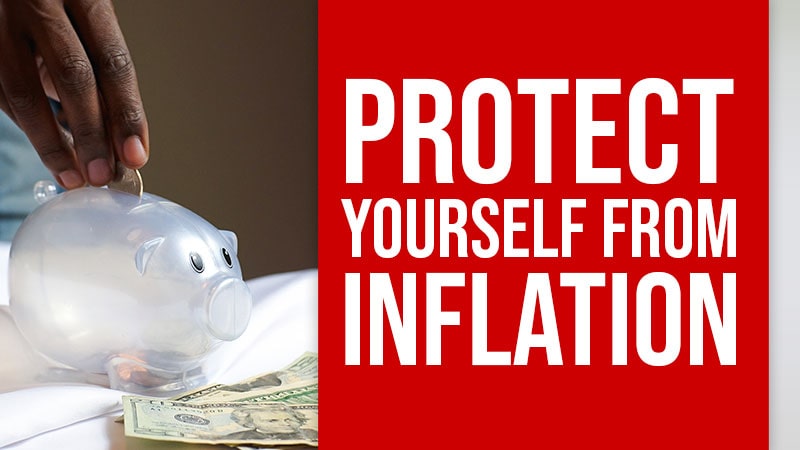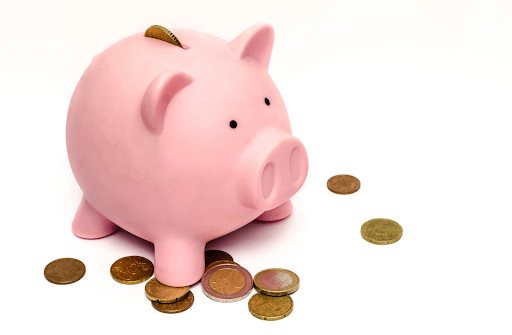7 Actionable Ways to Protect Yourself From Inflation Now
Share this content :

Since June of last year, the inflation rate has been steadily increasing. Currently, it’s approximately 9.1%, the highest it has ever been in over 30 years. Thanks to this jump, the prices of food and amenities have been skyrocketing. Gasoline prices have increased by over 60%, and the monthly rent has increased by double digits.
As you sit there and think about your savings, you might ask when inflation will finally slow down. Unfortunately, the Federal Reserve has predicted that the percentage will still be above 2% by next year. While signs suggest inflation will begin to drop, it won’t be by a drastic amount. For now, you’ll need to learn how to handle inflation as it is. To help you understand how to deal with the price hike, here’s what you need to about how you can protect yourself from inflation.
What is inflation?
First, let’s explain what the issue is. The term “inflation” means a rise in overall consumer prices. When you notice that the costs of food and other services are rising, inflation is affecting the market. It’s not just a local issue; this price hike occurs everywhere in the country.

There are two main reasons why inflation can occur. The first is that there’s too much demand for available goods. Remember that the entire world went through a debilitating pandemic, which forced many businesses to temporarily or permanently close. Now that more and more shops are beginning to open up again, the demand for available materials has skyrocketed.
For example, too many companies and outlets might want chicken meat for their meals. Consider how many chefs, diners, restaurants, and fast food chains will need chicken for their dishes. With so much demand, prices will go up to compensate.
The second reason is that the cost of production might be too much. Going back to the chicken example, perhaps the price of transporting the meat is getting higher. There might be an ongoing shortage of available fuel for the trucks.
Alternatively, supplies might take longer to replenish because workers have only just started returning at an onsite capacity. In other words, the production and delivery rate for this chicken meat might take a while to become fully operational. Until then, the cost of production will remain high, which forces the price of chicken to match.
How does inflation affect you and your money?
Now that you understand inflation, you might be wondering exactly how it affects you. Here are four ways that rising consumer prices can drastically change your lifestyle and financial plans
It affects your daily expenses.
First, you’ll quickly notice that your day-to-day expenses are much higher than usual. No matter your lifestyle, consumer prices will start adding more numbers to your daily costs. Your budget will take some serious hits, leaving you with less than expected.
It can weaken your spending power.
As prices increase, your ability to purchase and spend will decrease. You’ll find that $20 a day might not meet the same standard that you’re used to. Remember that prices are going up everywhere. This means you’ll have to compensate with more cash for food, fuel, transport, clothing, and other needs in life. That’s why to protect yourself from inflation, you’ll need to keep a closer eye on your spending habits. Otherwise, you might go over budget before you even realize it.
It can delay your financial plans.
Because the overall cost of goods has to adjust, you might need to save more or wait longer to achieve your goals. Your initial projected numbers for buying a house or clearing your debts might take more money now.
On the other hand, you might not have as much money available to save or divert towards your existing loans. Either way, you’ll find it tougher to plan out your future financial goals as you try to adjust for the potential cost now. Waiting could help, but there’s no telling how soon inflation will fall.
It can cause mental and emotional stress.

Ultimately, everything about inflation has disrupted many financial plans and budgets. You’ve probably felt a lot of stress and worry about how you will cope. You and your family might be anxious about how you’ll manage in the next few months. Feeling nervous about how you will handle inflation and its effects is normal. However, remember that you don’t have to be afraid of it. There are ways to fight back and keep your money secure.
How can you protect yourself from inflation?
While the prices might be higher, there are ways you can fight back against the rising numbers. With these seven actionable tricks, you can start to build an effective financial plan. Here’s how you can start to protect yourself from inflation.
1. Review and reduce your expenses.
Your spending habits will significantly change because of the cost of your daily needs. To make things easier, reduce how much you spend on your amenities. Check your weekly budget and see how much you spend on certain things. For example, ask yourself how much you pay for your groceries. With the groceries list, check for anything that you don’t need in your life. Perhaps you can cut down on the number of snacks you buy. Once you spot what can be reduced or removed, adjust your spending accordingly. If you need to pay for something, like your monthly rent, consider diverting cash from a less important fund
2. Postpone any large purchases.
Are you planning on buying a car or a house anytime soon? While you have every right to do so, the current inflation climate might not be ideal for these purchases. The cost of ownership is higher than its ever been. Because of this price hike, you might want to postpone when you buy your next big purchase.
See if there are alternatives that can help you manage for the meantime, like rent. If you must purchase your house or car now, make sure you divert enough cash to help you pay off the resulting fees for the next few months. By being a little more patient, you can protect yourself from inflation and save yourself a massive money headache.
3. Remove any existing debts.
With inflation hitting the highest percentage it’s ever been, it’s more crucial than ever to get rid of your existing debts. If you have any outstanding bills for credit or student loans, try to cut them down immediately. You could pay above the minimum fee to clear it out faster. By removing your debts now, you’ll be able to save more money and focus on your daily expenses. Plus, it’s much nicer when you finally get rid of any bills in your backlog.
4. Expand your investment options.
Inflation is usually seen as negative, especially with how it affects the cost of living. However, that doesn’t mean it’s entirely negative. Inflation has raised investors’ worth of assets, such as stocks and bonds. In other words, the price of their chosen investments has gone up. You can use these assets to trade for more money and stabilize your portfolio.
Aside from stocks and bonds, another recommended investment is cryptocurrency. These online-only currencies use blockchain technology to allow faster money transfer and trade. Examples of profitable cryptocurrencies include Bitcoin, Ethereum, and Tether.
5. Build a backup budget.
While investment is an adequate safeguard against the price hike, you might not always get it in time. Trading and transferring money between investors could take a while to realize fully. To keep yourself safe immediately, consider building or expanding your backup budget. This budget, also known as an emergency fund, is a different amount of savings meant only for unexpected costs, like car accidents or immediate surgery.
For inflation, a backup budget can help you cover any existing bills and pay off your monthly fees. More importantly, it’ll keep your earnings safe as you reassess and reshape your financial plan.
To protect yourself from inflation effectively, check if your emergency fund can cover up to six months’ worth of expenses.
6. Keep tracking the inflation rate.
You never know how much the inflation rate will rise or fall tomorrow. For all we know, it could easily fall back under 2% by 2024, and it could not. You should always keep an eye out for whatever percentage it may be and see how much has changed. Tracking the inflation rate is also an excellent way to track your budget. You’ll have more time to adjust and adapt to increased or decreased costs accordingly. For more accurate predictions, take time to consult with a financial advisor. They can help you plan your budget carefully and adjust your spending limits to match the new inflation rate.
7. Stay cautious.
Lastly, remember that you should always be prepared. You might want to spend a lot of money when the inflation rate finally decreases. That’s not what you should be doing. If anything, you should actively use this chance to prepare your backup budget and pay off your existing debts. Don’t celebrate just yet. Instead, keep an eye out and optimize your finances as much as possible. When the inflation rate finally falls to normal, you’ll be glad you don’t have any outstanding bills to pay.
In summary
Experts have said that inflation could last longer than a year, even though it’s already at its highest point in three decades. Because of this, your financial plans will change. Your expenses will cost more than usual, and you might struggle to pay your bills, like mortgage and credit debt. To be safe, review your financial plan and act accordingly. Examples of what you can do include reducing unnecessary spending, expanding your investment portfolio, and building an emergency fund. With these tactics, you’ll be able to stay afloat and protect yourself from inflation until things finally become more stable.

Do you want to break free from your financial burdens and start living the life that you deserve? I have the answer for you. In this FREE book I created, which you can download here, I will share real-world steps and techniques you can use to grow your money. Download it now before it’s gone!
Share this content :
Copyright © 2023 Munif Ali. All rights reserved.

